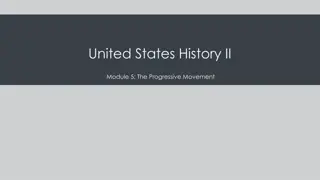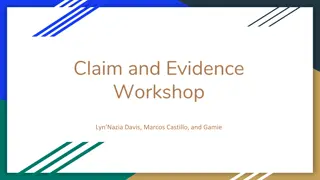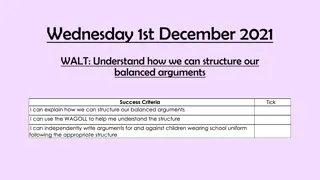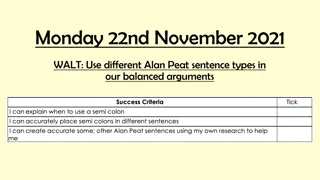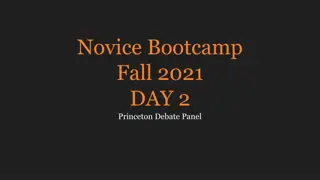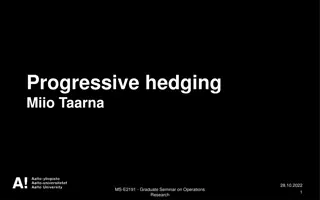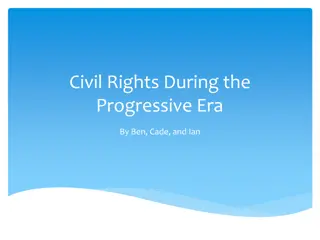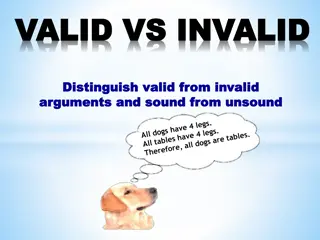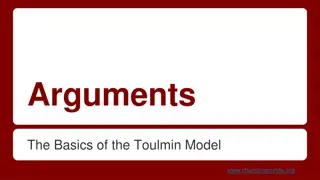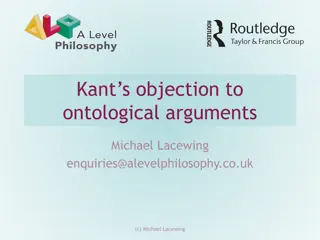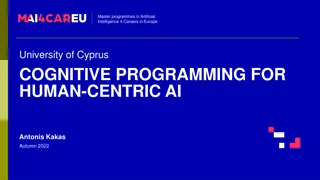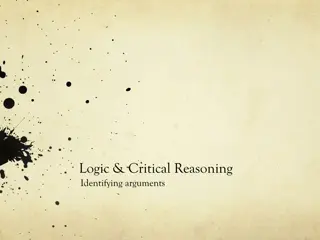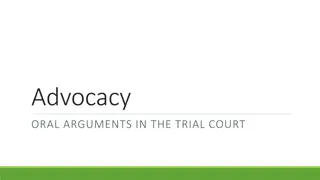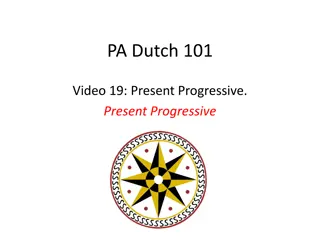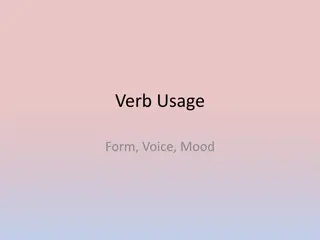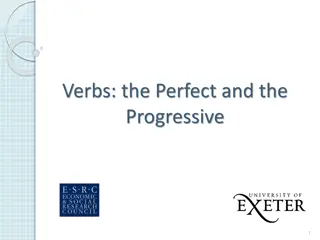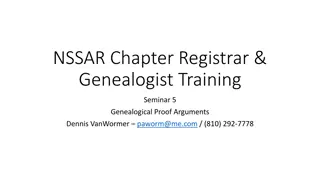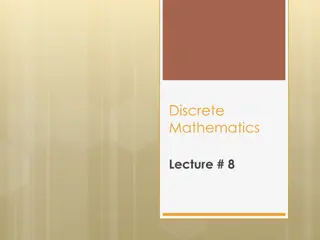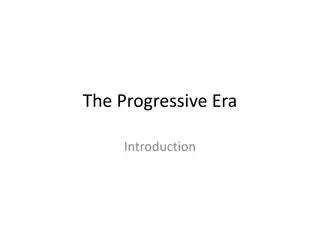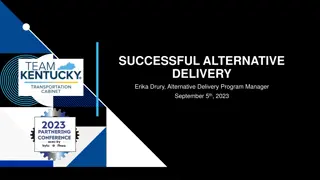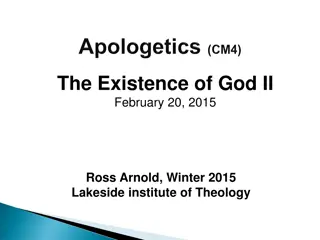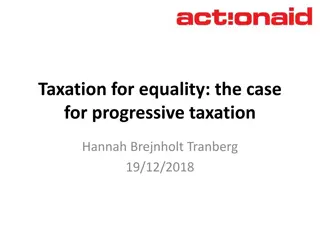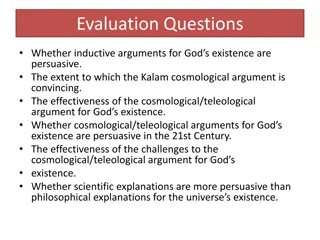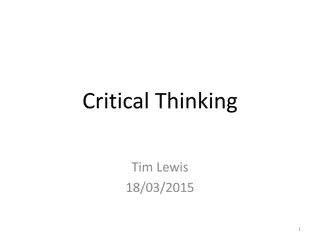Progressive Approach to Relational Entity Resolution
In this research paper authored by Yasser Altowim, Dmitri Kalashnikov, and Sharad Mehrotra, a progressive approach to relational entity resolution is presented. The study focuses on balancing cost and quality in entity resolution tasks for relational datasets. The goal is to develop a method that ac
1 views • 20 slides
Understanding the Progressive Movement in United States History II
Explore the Progressive Movement in US History II Module 5, focusing on major movements, politics, muckrakers' role, reform leaders, women's rights, civil rights, and progressive policies under Roosevelt, Taft, and Wilson. Learn about grassroots Progressivism, social justice reformers, the Triangle
4 views • 38 slides
English Grammar Exercises: Simple Present and Present Progressive
Practice forming sentences in simple present and present progressive tenses through a series of exercises. The exercises include questions, affirmatives, negatives, and short forms of the verb "to be." Improve your English grammar skills with these interactive tasks.
3 views • 14 slides
Pragmatic Analysis of Directive Verbs in Progressive Relaxation
In this study, the Enaction Model and Impositive Strategy are applied to analyze the directive speech acts in Progressive Relaxation, a technique used in hypnosis. The research uses qualitative methods to examine the scripts and classifies the directive speech acts based on specific models. Previous
3 views • 9 slides
Best Progressive Lenses in Alexandra
ORIAN @ Anchorpoint provides the Best Progressive Lenses in Alexandra. They are redefining value in eyewear. Their passionate team goes above and beyond to ensure every customer finds the perfect pair of glasses that not only enhances their vision but also complements their style. Visit them today a
1 views • 6 slides
Mastering the Toulmin Method for Constructing Persuasive Arguments
Learn how to effectively structure arguments using the Toulmin Method, which consists of Claim, Data, Warrant, Backing, Counterclaim, and Rebuttal elements. Explore reasoning and logic concepts, differentiate between inductive and deductive reasoning, and understand how to construct valid arguments
0 views • 30 slides
Understanding the Structure of Balanced Arguments
Explore the concept of using the third person in writing balanced arguments to maintain objectivity and structure. Learn about third person pronouns and the importance of being unbiased in your writing. Understand the significance of structuring your arguments and maintaining a clear order for effec
0 views • 11 slides
Almira School District Progressive Design-Build K8 School Project
Almira School District's application for project approval highlights the progressive design-build approach for replacing a K8 school. The project team, led by experienced professionals, aims to negotiate scope, manage budget, secure funding, and ensure code compliance while building a new facility f
0 views • 14 slides
Mastering Alan Peat's Balanced Arguments with Different Sentence Types
Explore the use of various Alan Peat sentence types in crafting balanced arguments, focusing on incorporating semi-colons effectively. Engage in interactive activities and practice sessions to enhance your skills in creating compelling arguments. Dive into examples and exercises to refine your under
1 views • 12 slides
Mastering Debate: Essential Strategies and Techniques
Learn key concepts like argument structure, points of clarification, and how to make compelling arguments in a debate setting. Discover the importance of warrants, impacts, and implications in formulating strong arguments. Explore tips on coming up with effective arguments and understanding differen
0 views • 47 slides
Mastering Final Focus in Debates
Final Focus, a crucial 2-minute speech at the end of a debate, serves as your last chance to persuade the judge of your victory. It involves comparing key voters and emphasizing the impact of your arguments. Weighing key voters is essential, with a focus on demonstrating why the scale tips in your f
1 views • 4 slides
Understanding Progressive Hedging Algorithm in Operations Research Seminar
Explore the Progressive Hedging algorithm discussed in the Graduate Seminar on Operations Research. Topics include general framework, resource allocation examples, and handling non-convexity in decision-making. Dive into scenario decomposition and scenario-specific decision-making for well-hedged so
0 views • 28 slides
Understanding Reasonable Arguments vs. Pseudo-Arguments
The provided content focuses on distinguishing between reasonable arguments and pseudo-arguments through thought-provoking questions such as the ethical treatment of animals, city subsidies for sports venues, and subjective opinions on aesthetics. It also explains the structure of an argument, highl
0 views • 18 slides
Challenges Faced by African Americans During the Progressive Era
African Americans in the Progressive Era faced significant challenges in education, employment, and social acceptance. They were oppressed, segregated in schools, limited to non-skilled jobs with lower wages, and were victims of racial violence and discrimination, such as lynching. Leaders like Book
0 views • 21 slides
Understanding Valid and Invalid Arguments in Logic
In logic, arguments consist of premises supporting a conclusion, with deductive arguments claiming logical necessity. Valid arguments have premises implying the conclusion, making them deductively valid. For example, if all actors are robots and Tom Cruise is an actor, then logically Tom Cruise must
0 views • 25 slides
An Examination of Ontological Arguments for God's Necessary Existence
Various ontological arguments, such as Malcolm's and Anselm's, propose that the existence of God is logically necessary, grounded in the concept of God as the greatest possible being. These arguments challenge the coherence of the concept of God and counter objections, like Kant's claim that existen
2 views • 10 slides
Understanding the Toulmin Model for Effective Argumentation
The Toulmin Model provides a structured approach to crafting and evaluating arguments, consisting of key components like claims, grounds/data, and warrants. It emphasizes the importance of using evidence and reasoning to support claims effectively. By understanding this model, one can enhance the pe
0 views • 13 slides
Kant's Critique of Ontological Arguments
An exploration of Kant's objection to ontological arguments, examining the flaws in the reasoning of Anselm and Descartes. Kant argues that existence is not a predicate and does not enhance the concept of a being. Therefore, ontological arguments cannot prove the existence of God solely through conc
0 views • 7 slides
Understanding Argumentation and Realization in AI Master Programmes
Exploring the concept of argumentation and its realization in artificial intelligence master programmes, focusing on the construction, evaluation, and implementation of arguments through cognitive programming. The framework involves structured argumentation, conflict relations, and strength/preferen
1 views • 31 slides
Understanding Logic and Critical Reasoning: Identifying Arguments
In the study of logic and critical reasoning, identifying arguments is a fundamental task. Arguments consist of premises supporting a conclusion, and they can be identified by specific indicators and techniques. Understanding argument structure and types of support, such as deductive and inductive,
2 views • 15 slides
Guide to Oral Arguments in Trial Court
Learn how to conduct oral arguments in a trial court, including the steps for both the movant and respondent, strategies for making strong arguments, and tips for responding effectively. This comprehensive guide covers the dos and don'ts of oral arguments, emphasizing the importance of preparation,
0 views • 9 slides
Supporters of Slavery in the 19th Century: Legal, Religious, and Economic Arguments
In the 19th century, defenders of slavery utilized legal arguments by denying citizenship rights to blacks, religious arguments by justifying ownership and guidance through biblical references, and economic arguments by comparing treatment of slaves in the South to conditions of workers in the North
0 views • 4 slides
Understanding Command-line Arguments and Errors
Learn how to utilize command-line arguments in Python scripts to enhance flexibility and parametrize functions for various inputs. Explore ways to access and utilize command-line arguments effectively, while handling errors gracefully.
0 views • 30 slides
Learning Present Progressive in PA Dutch
Explore the concept of Present Progressive in PA Dutch through examples and practice exercises. Understand the differences between the two present tense forms and learn how to form sentences in Present Progressive. Practice translating sentences using both normal conjugation and the Present Progress
0 views • 7 slides
Understanding Verb Forms: Simple, Progressive, and Emphatic
English verbs have three forms: simple, progressive, and emphatic. The progressive form consists of a form of "to be" followed by the -ing form of the verb. While some may consider progressive forms as separate tenses, they mainly reflect aspects rather than time differences. Excerpts from "Twilight
0 views • 17 slides
Colorado Department of Transportation Progressive Discipline Course Overview
This course offered by the Colorado Department of Transportation focuses on Progressive Discipline, covering topics such as the process of progressive discipline, resolving performance issues, connecting performance management with discipline, and resources available for supervisors/managers. Partic
0 views • 55 slides
Understanding Verbs: Perfect vs Progressive
The concept of verbs in English is explored through the perfect and progressive forms. The National Curriculum references the use of progressive forms in Year 2 and the present perfect form in Year 3. Tense, aspect, perfect, and progressive aspects of verbs are explained with examples to illustrate
0 views • 8 slides
Understanding Future Progressive Tense in English Grammar
Future Progressive Tense, also known as Future Continuous Tense, is used to indicate actions that will be ongoing at a specific point in the future. This tense emphasizes the continuous nature of an action happening in the future. Learn how to form and use the Future Progressive Tense through exampl
0 views • 22 slides
Analyzing Arguments in English Debates: A Critical Approach
Explore and critique various arguments presented in English debates, including topics like dietary recommendations, digestion issues with Japanese rice, and driving skills in different weather conditions. Learn how to evaluate evidence, causality, and persuasiveness in arguments to develop critical
0 views • 19 slides
Mastering Academic Writing Moves: The Art of Summarizing
In academic writing, mastering the art of summarizing is crucial for persuasive arguments. By engaging in dialogue with others and summarizing their arguments, writers can strengthen their position. It is important to strike a balance between the original author's ideas and your own, emphasizing asp
0 views • 15 slides
An Overview of Debate: Propositions, Teams, and Formats
Debate is a regulated discussion between two matched sides discussing a proposition, with the affirmative arguing for change and the negative defending the status quo. The standard debate format involves constructive arguments followed by rebuttals from both sides. The roles in a debate include the
0 views • 47 slides
Genealogical Proof Arguments and SAR Standard of Proof
This detailed content covers the definitions and components of genealogical proof arguments, proof summaries, and the SAR standard of proof. It explains the importance of evidence quality, source citations, and analysis in establishing acceptable genealogical conclusions for SAR membership applicati
0 views • 22 slides
Understanding Valid and Invalid Arguments in Discrete Mathematics
Concepts of valid and invalid arguments in discrete mathematics are explored through examples. Learn how to determine the validity of arguments based on premises and conclusions. Practice using truth tables to evaluate argument forms. Enhance your logical reasoning skills in Discrete Mathematics.
0 views • 22 slides
Understanding the Progressive Era: Origins, Movement, and Goals
The Progressive Era in late 19th century America was marked by significant political, economic, and social reforms. Originating from the need to address injustices and restore economic opportunities, the Progressive Movement aimed to create lasting changes in society. With goals including protecting
0 views • 12 slides
Progressive Contracting Methods in Infrastructure Projects
Progressive contracting methods, such as Progressive Design Build (PDB) and Construction Manager/General Contractor (CM/GC), are being actively utilized by KYTC for infrastructure projects. These methods offer benefits like better risk mitigation and price certainty. Learn about the differences betw
0 views • 14 slides
Philosophical Apologetics: Arguments for the Existence of God
Philosophical apologetics presents various arguments for the existence of God, including the ontological, cosmological, teleological, moral, transcendental, and presuppositional arguments. These arguments cover diverse aspects such as change, causality, design, contingency, miracles, consciousness,
0 views • 10 slides
The Case for Progressive Taxation: Ensuring Equality Through Fair Contributions
Progressive taxation involves higher tax rates for individuals with higher incomes or greater wealth, aiming to bridge economic and gender inequalities. This system can be achieved through well-designed tax scales, exemptions, and thresholds, ultimately contributing to fair distribution of contribut
0 views • 8 slides
Evaluating Arguments for God's Existence in the 21st Century
Exploring the persuasiveness of inductive arguments for God's existence, assessing the Kalam cosmological argument, and evaluating the effectiveness of cosmological/teleological arguments. Delving into whether scientific explanations surpass philosophical ones, the strengths and weaknesses of these
0 views • 16 slides
The Radical Center: Jane Addams and the Progressive Movement
This chapter explores the life journey of Jane Addams and her role during the Progressive Era. It reflects on how societal changes, women's independence, and collective struggles shaped the middle class, challenging traditional norms. The chapter discusses the emergence of the progressive movement d
0 views • 5 slides
Understanding Critical Thinking, Hypotheses, and Arguments
Explore the concepts of critical thinking, hypotheses, and arguments in this informative content. Learn about the definition of hypotheses, the nature of arguments, and syllogisms. Delve into the world of logical reasoning and the foundations of thought processes.
0 views • 32 slides

